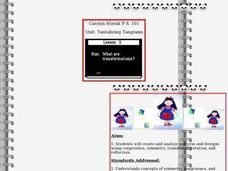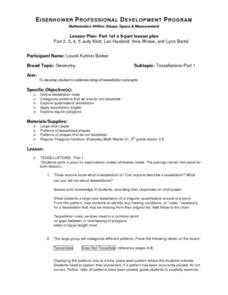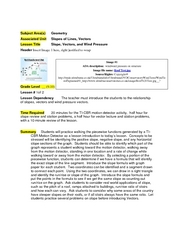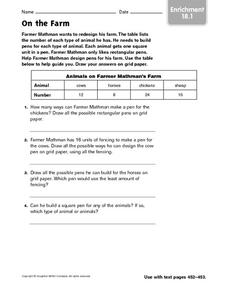Curated OER
Geometry Practice: Transformations, Isometries, and Tessellations
Five pages for geometry practice relating to symmetry provide mathematicians with exercises on transformations and symmetry, properties of isometries, compositions of transformations, tessellations with regular polygons, and other...
Curated OER
Tessellations
Fifth graders investigate the relationship between math and art by examining patterns and polygons.They examine how polygons make up the patterns that form tessellations, and determine tessellations that occur in nature. Finally, they...
Mathed Up!
2D and 3D Shapes
What a great assessment to give young mathematicians in order to test their knowledge on two- and three-dimensional shapes. Learners name various shapes, identify the number of edges, faces, and vertices, match an unfolded version of a...
Curated OER
Why is this lesson constructivist?
Students formulate a definition of tessellations by comparing and contrasting different patterns and shapes of real objects. They discuss the relatioship between shapes and patterns as well as their function in the real world. Students...
Curated OER
Tantalizing Tangrams: What Are Transformations?
Students use the Internet to learn about transformations and tessellations. In this geometry lesson, students use the Internet to define the meaning of reflections, translations, rotations, glide reflection and symmetry. ...
Pennsylvania Department of Education
Length and Perimeter
Third graders explore tessellations and the spatial concepts used in creating them. In this tessellations lesson, 3rd graders rotate, reflect and transform shapes to create tessellations. Students become familiar with the...
Curated OER
Architecture
Students study tessellations and the work of M.C. Escher. They discuss the terminology of architecture, the historical significance of architecture in different parts of the world, and create their own piece of architecture out of...
Curated OER
Geometry /Tessellations
Students investigate the concept of tessellations and how they are formed using angles. They categorize how different patterns do and not tessellate and separate them into two different places for assessment. The teacher draws examples...
Curated OER
Refining and Reasoning Behind Scale Drawings
Learners discuss accuracy and the need for it in blueprints in order to create the final project. They further refine and perfect drawings as part of the school drawing project. Students create a blueprint for the new school building...
Curated OER
Slope, Vectors, and Wind Pressure
A hands-on lesson plan using the TI-CBR Motion Detector to provide information to graph and analyze. The class uses this information to calculate the slope of motion graphs and differentiate scalar and vector quantities. There is a...
Curated OER
M. C. Escher - Design - Math Integration
Students create a tessellations using rotation and translation. They also create a tessellation using reflection.
Curated OER
Tessellations
Seventh graders investigate geometric shapes using tessellations. In this geometry lesson, 7th graders practice tessellations using different shapes. They create different designs using tessellations.
Curated OER
On the Farm - Enrichment 18.1
In this square unit worksheet, students read the word problem about the pens Farmer Mathman wants to build for his animals. Kids then use the table to guide them. Students draw their answers on grid paper and then answer the four word...
Curated OER
Problem-Solving Strategy: Find a Pattern: Practice
For this tessellation worksheet, 7th graders use patterns to draw tessellations for the given shapes and colors. Students solve five problems.
Curated OER
Tiling the Plane
Fifth graders use pattern blocks and triagular grid paper to reivew shape names, be introduced to the concept of a tiling of the plane, and determine which pattern blocks tile the plane. They are asked if they comprehend what a...
Curated OER
Five E Lesson Plans For Math
Students use the Five E method to solve problems. For this Five E lesson, students complete math lessons using the Engage, Explore, Explain, Elaborate, and Evaluate technique. They use the Five E's with lessons on tessellations, magnets,...
Creative Educator
Tessellation Sensation
Geometers investigate patterns and symmetry, and examine the artwork of M.C. Escher on the Internet. They compare his style to the floor and ceiling tiles in the classroom. If you have ImageBlender™ software, you could have your...
K12 Reader
The Art of M.C. Escher
Show your class one way in which art and math are related by teaching them about M.C. Escher. Class members read a brief passage and then respond to five related questions.
Curated OER
Adopt An Insect
This lesson plan combines a creative building activity with analyzing a butterfly photograph and using problem solving to complete the puzzle. It blends art and science very well. Students will learn and enjoy the process. The extension...
Curated OER
Miras, Mirrors, and Kaleidoscopes!
High schoolers use hands-on activities to explore transformations. They view a video segment that demonstrate how M. C. Escher employed geometry and transformations to create so many of his famous drawings.
Curated OER
Lines and Patterns
Here are six outstanding art lessons on geometry, line, shape and form, light and shadow, line and pattern, and tessellation for you. Each activity is well-worth implementing with your art students. These lessons would be especially good...
National Gallery of Canada
Self-Portrait, Mirrors and Metamorphosis!
Using M.C. Escher's Hand with Reflecting Sphere as inspiration, learners create their own set of self-portraits using various reflective surfaces. The lesson begins with a discussion about portraiture and ends with a presentation of work...
Curated OER
Figure This! Math Challenges for Families
Young mathematicians complete a family math challenge packet. They will complete a packet of mixed math activities. They work with graphs, comparing numerical data, tessellations, and probability.
Curated OER
Polynominoes
In this polynominoes worksheet, 10th graders solve 9 different problems relating to various types of polynominoes, such as triominoes and tetrominoes. First, they determine how many different types of triominoes they can locate and draw...

























